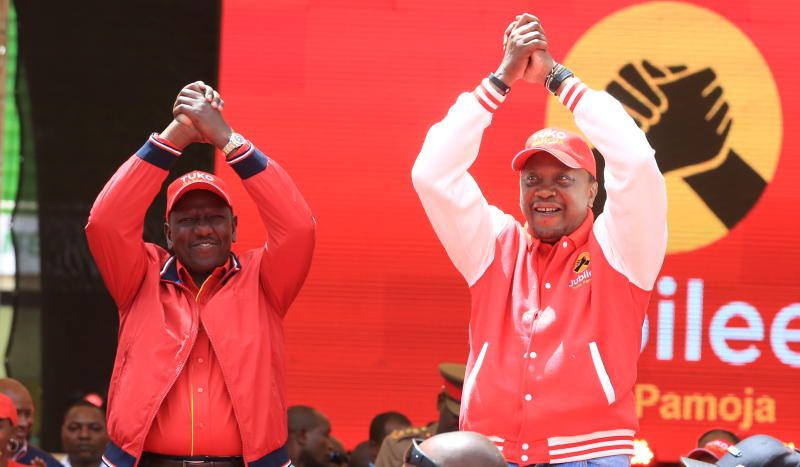High Court affirms legitimacy of Jubilee’s previous delegates convention, reinstating Uhuru Kenyatta’s leadership.
New party leadership confirmed: Saitoti Torome as National Chairman, Jeremiah Kioni as Secretary-General.
The rival faction led by Kanini Kega and Sabina Chege is effectively disbanded.
Former chairman Nelson Dzuya’s shift in support proved pivotal in the ruling.
The decision positions Jubilee for renewed political relevance under Uhuru’s vision.
Uhuru Kenyatta Reclaims Full Control of Jubilee Party After Court Victory Over Rival Faction
A Quick Recap of This Story
In a pivotal legal development, the Jubilee Party’s long-standing leadership crisis has been brought to a definitive close, firmly reinstating former President Uhuru Kenyatta as the party’s leader.
The High Court ruled in favor of the legitimacy of the resolutions passed by the party’s previous National Delegates Convention, which had been at the heart of a protracted internal dispute. This judgment effectively cancels out earlier attempts to undermine the authority of the leadership appointed during that convention.
The court’s decision ends months of instability and competing claims within Jubilee, placing the party back in the hands of its former and founding leader. It’s a legal and symbolic victory for Uhuru Kenyatta, who has now fully reclaimed the political machinery that once propelled him to national power.
Party Leadership Recast
With this ruling, Jubilee’s internal structure has been officially realigned. Saitoti Torome is confirmed as the National Chairman, and Jeremiah Kioni resumes his role as Secretary-General. These appointments, endorsed by the previous national convention, had been a source of fierce contention, particularly by a rival faction within the party.
This faction—led by Kanini Kega and Sabina Chege—had positioned itself as the rightful steward of the party, claiming procedural irregularities and political betrayal. Their position has now been conclusively dismissed by the court, which found no legal basis to invalidate the decisions of the national delegates. The ruling brings their leadership claims to an abrupt and final halt.
The Dzuya Factor: A Silent Game-Changer
A crucial moment in this saga came when former Jubilee Chairman Nelson Dzuya dramatically altered his stance. Having previously been aligned with the faction opposing Kenyatta’s leadership, Dzuya later affirmed the legitimacy of the earlier convention through a formal legal filing. This shift not only weakened the Kega-Chege front but also gave judicial weight to the convention’s resolutions.
His consent proved instrumental in resolving the impasse. With Dzuya no longer contesting the leadership, the scales tipped definitively in favor of Kenyatta’s side. The court viewed this development as an acknowledgment that internal party processes had been respected and properly followed.
Political Ripples: What It Means for Jubilee

The implications of this court ruling extend far beyond an internal party reshuffle. Jubilee, long seen as fragmented and adrift following Kenyatta’s retirement and President William Ruto’s ascendancy, now has a chance to redefine its relevance in Kenya’s political future.
Under Uhuru’s renewed control, the party is expected to focus on consolidation, rebuilding its national presence, and regaining the confidence of its traditional base. This includes resolving grassroots grievances, mending organizational fractures, and reasserting its ideological stance.
The party’s potential role in the next political cycle is already a subject of speculation. Some anticipate a comeback strategy aligned with other opposition blocs, while others see a broader national agenda emerging from the Kenyatta-led outfit. Regardless, Jubilee’s internal clarity is a prerequisite for any serious engagement with Kenya’s evolving political dynamics.
A Calculated End to Internal Discord
The High Court’s verdict sends a clear message about party governance: that legitimacy stems not from factional dominance, but from due process and constitutional order. It reinstates a leadership that had been under siege and returns the reins to a man whose political presence continues to shape Kenya’s trajectory, even from outside the presidency.
For the Kenyatta camp, this is more than a legal win—it is a restoration of order, of legacy, and of direction. The door is now open for Jubilee to operate with unity, free from the paralyzing disputes that once threatened to dismantle it.
Final Word
Jubilee’s future under Uhuru Kenyatta is not just a political story; it is a study in resilience, loyalty, and the importance of institutional structure in political parties. The judgment handed down by the High Court restores that structure—and with it, a leader many believed had exited the stage for good.
This moment could mark a revival not only for Jubilee but for a new wave of center-ground politics in Kenya. The next steps will define whether that promise becomes reality or remains symbolic.

0 comments
Be the first one to comment, but before that...
Here are some best practices for writing comments: